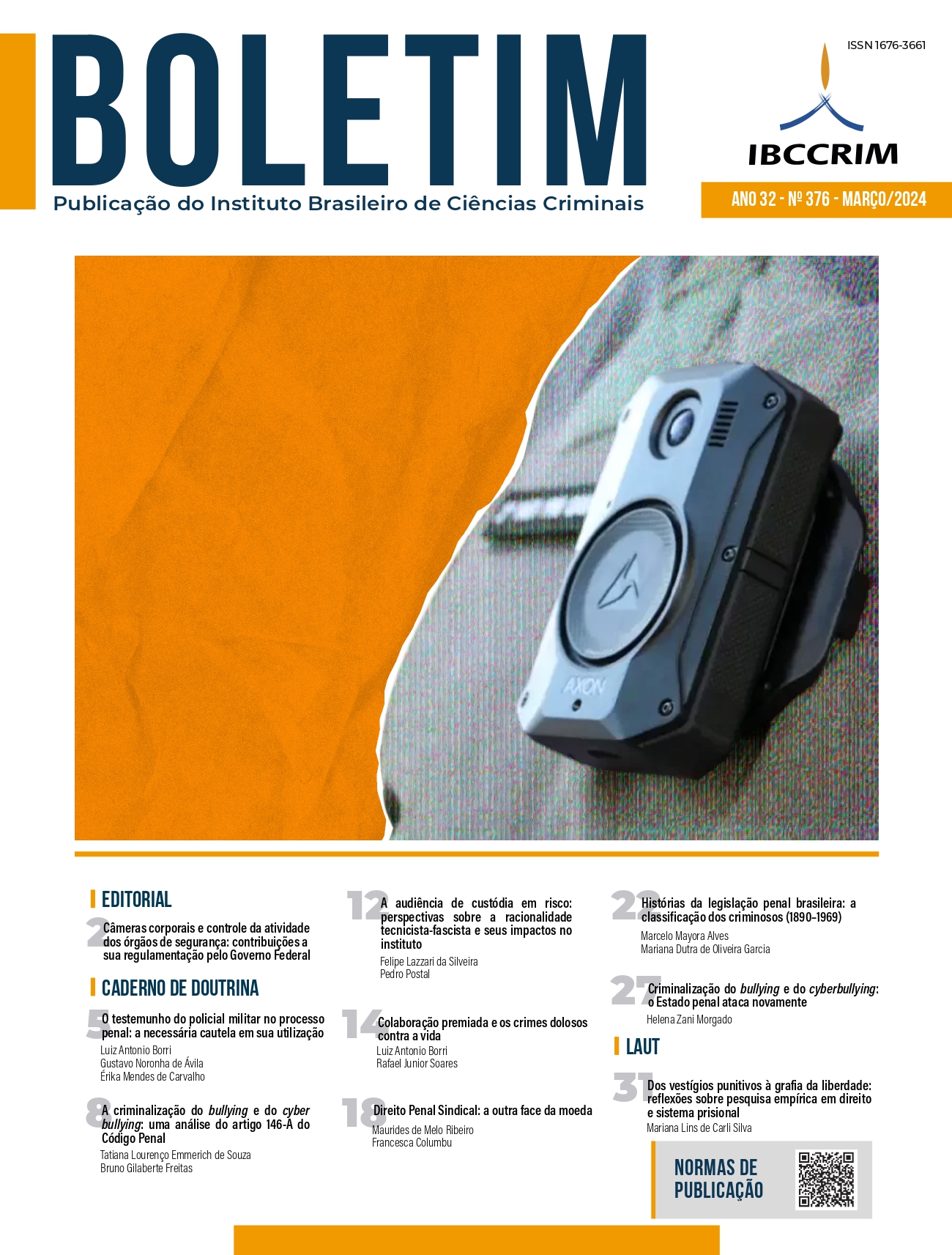The military police officer’s testimony in criminal procedure: the necessary caution in its use
Views: 619DOI:
https://doi.org/10.5281/zenodo.10564721Keywords:
Memory-dependent criminal evidence, Military police, Eyewitness psychology, Criminal proceedings guaranteesAbstract
This paper analyses the persistent problem of the military police officer’s testimony in criminal procedures. From the perspective of a criminal process of guarantees and eyewitness psychology, the aim was to present the challenges and complexities involved in the assessment of this criminal evidence dependent on memory in Brazil. In the end, the necessary position of caution is presented, rejecting its indiscriminate use, especially as the only source of evidence. In this way, it will be possible to preserve fundamental rights and prevent convictions of innocent people.
Downloads
Publication Facts
Reviewer profiles N/A
Author statements
- Academic society
- Instituto Brasileiro de Ciências Criminais
- Publisher
- IBCCRIM
References
ÁVILA, Gustavo Noronha de. Falsas memórias e sistema penal: a prova testemunhal em xeque. Lumen Juris, 2013.
ÁVILA, Gustavo Noronha de; BORRI, Luiz Antonio. A cadeia de custódia da prova penal dependente da memória: diálogos entre a psicologia do testemunho e a dogmática processual penal. In: CONSELHO NACIONAL DE JUSTIÇA. (Org.). Reflexões sobre o reconhecimento de pessoas: caminhos para o aprimoramento do sistema de justiça criminal. Brasília: CNJ, 2022. v. 1, p. 50-68.
BORRI, Luiz Antonio; ÁVILA, Gustavo Noronha de. A cadeia de custódia da prova no “Projeto de Lei Anticrime”: suas repercussões em um contexto de encarceramento em massa. Direito Público, v. 16, n. 89, 2019. Disponível em: https://www.portaldeperiodicos.idp.edu.br/direitopublico/article/view/3592. Acesso em: 23 jan. 2024.
CALDAS, Fernanda Furtado; PRADO, Alessandra Rapacci Mascarenhas. A presunção de veracidade dos testemunhos prestados por policiais: inversão do ônus da prova e violação ao princípio da presunção de inocência. Revista Brasileira de Ciências Criminais, São Paulo, v. 166, p. 85-127, 2020.
CECCONELLO, William Weber; ÁVILA, Gustavo Noronha; STEIN, Lilian Milnitsky. A (ir)repetibilidade da prova penal dependente da memória: uma discussão com base na psicologia do testemunho. Revista Brasileira de Políticas Públicas, Brasília, v. 8, n. 2, p. 1057-1073, 2018.
CLIFASEFI, Seema L.; GARRY, Maryanne; LOFTUS, Elizabeth F. Setting the record (or video camera) straight on memory: The video camera model of memory and other memory myths. In: DELLA SALA, Sergio (Org.). Tall tales about the mind and brain: Separating fact from fiction. Oxford: Oxford University Press, 2007. p. 60-75.
CHRISTIANSON, Sven‐Åke; KARLSSON, Ingemar; PERSSON, Leif G. W. Police personnel as eyewitnesses to a violent crime. Legal and Criminological Psychology, v. 3, n. 1, p. 59-72, 1998. https://doi.org/10.1111/j.2044-8333.1998.tb00351.x
CONSELHO NACIONAL DE JUSTIÇA. Justiça em números. Brasília: CNJ, 2021. Disponível em: https://www.cnj.jus.br/wp-content/uploads/2021/09/relatorio-justica-em-numeros2021-12.pdf. Acesso em: 23 jan. 2024.
CONSELHO NACIONAL DE JUSTIÇA. Relatório Final do Grupo de Trabalho sobre Reconhecimento de Pessoas. Brasília: CNJ, 2022. Disponível em: https://www.cnj.jus.br/wp-content/uploads/2022/12/relatorio-final-gt-sobre-o-reconhecimento-de-pessoas-conselho-nacional-de-jusica.pdf. Acesso em: 23 jan. 2024.
EBBINGHAUS, Hermann. Memory: A contribution to experimental psychology. Tradução: Henry A. Ruger e Clara E. Bussenius. Nova York: Teachers College, 1964. (Originalmente publicado em 1885)
GRADY, Rebecca Hofstein; BUTLER, Brendon J.; LOFTUS, Elizabeth F. What should happen after an officer-involved shooting? Memory concerns in police reporting procedures. Journal of Applied Research in Memory and Cognition, v. 5, n. 3, p. 246-251, 2016. https://psycnet.apa.org/doi/10.1016/j.jarmac.2016.07.002
KLEIDER‐OFFUTT, Heather M.; CAVRAK, Sarah E.; KNUYCKY, Leslie R. Do police officers’ beliefs about emotional witnesses influence the questions they ask? Applied Cognitive Psychology, v. 29, n. 2, p. 314-319, 2015. https://doi.org/10.1002/acp.3111
KUNDA, Ziva. The case for motivated reasoning. Psychological Bulletin, v. 108, n. 3, p. 480, 1990. https://psycnet.apa.org/doi/10.1037/0033-2909.108.3.480
MATIDA, Janaina Roland. O valor probatório da palavra do policial. Marcos Peixoto, Artigos – Sentenças – Decisões, jun. 2020. Disponível em: https://www.marcospeixoto.com/wp-content/uploads/2020/06/MATIDA_O-valor-probat%C3%B3rio-da-palavra-do-policial.pdf. Acesso em: 23 jan. 2024.
PEZDEK, Kathy; SHAPLAND, Tyler; BARRAGAN, Jessica. Memory outcomes of police officers viewing their body-worn camera video. Journal of Applied Research in Memory and Cognition, v. 11, n. 3, 392-404, 2022. https://psycnet.apa.org/doi/10.1037/mac0000013
STEIN, Lilian Milnitsky; ÁVILA, Gustavo Noronha de. Avanços científicos em psicologia do testemunho aplicados ao reconhecimento pessoal e aos depoimentos forenses. Brasília: Ministério da Justiça, Secretaria de Assuntos Legislativos, 2015. (Série Pensando Direito, n. 59)
STEIN, Lilian Milnitsky; ÁVILA, Gustavo Noronha de. Entrevistas forenses e reconhecimento pessoal nos processos de criminalização: um diagnóstico brasileiro. Boletim de Análise Político-Institucional, Brasília, n. 17, p. 45-51, 2018. Disponível em: https://repositorio.ipea.gov.br/bitstream/11058/8866/1/bapi_17_cap_6.pdf. Acesso em: 23 jan. 2024.
VREDEVELDT, Annelies; VAN KOPPEN, Peter J. The thin blue line-up: Comparing eyewitness performance by police and civilians. Journal of Applied Research in Memory and Cognition, v. 5, n. 3, p. 252-256, 2016. https://doi.org/10.1016/j.jarmac.2016.06.013
Downloads
Published
How to Cite
Issue
Section
License
Copyright of published articles belongs to the author, but with journal rights over the first publication and respecting the one-year exclusivity period. Authors may only use the same results in other publications by clearly indicating this journal as the medium of the original publication. If there is no such indication, it will be considered a situation of self-plagiarism.
Therefore, the reproduction, total or partial, of the articles published here is subject to the express mention of the origin of its publication in this journal, citing the volume and number of this publication. For legal purposes, the source of the original publication must be consigned, in addition to the DOI link for cross-reference (if any).


 Português (Brasil)
Português (Brasil)
 English
English
 Español (España)
Español (España)







